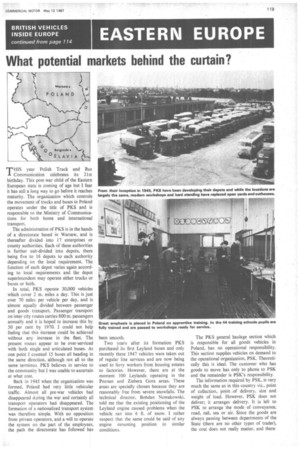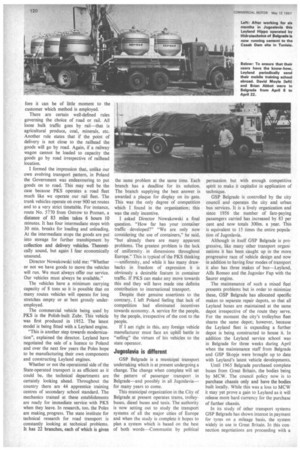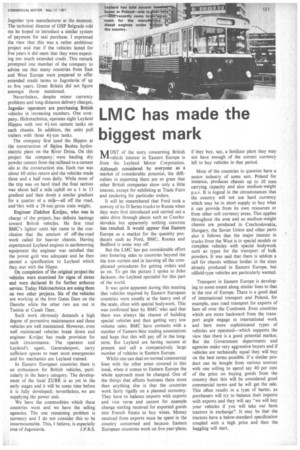What potential markets behind the curtain?
Page 121

Page 122

Page 123

If you've noticed an error in this article please click here to report it so we can fix it.
ri" HIS year Polish Truck and Bus Communication celebrates its 21st birthday. This post-war child of the Eastern European state is coming of age but I fear it has still a long way to go before it reaches maturity. The organization which controls the movement of trucks and buses in Poland operates under the title of PKS and is responsible to the Ministry of Communications for both home and international transport.
The administration of PKS is in the hands of a directorate based in Warsaw, and is thereafter divided into 17 enterprises or county authorities. Each of these authorities is further sub-divided into depots, there being five to 16 depots to each authority depending on the local requirement. The function of each depot varies again according to local requirements and the depot superintendent may operate either trucks or buses or both.
In total, PKS operate 30,000 vehicles which cover 2 m. miles a day. This is just over 70 miles per vehicle per day, and is Almost equally divided between passenger and goods transport. Passenger transport on inter-city routes carries 800 m. passengers annually and it is hoped to increase this by 50 per cent by 1970. I could not help feeling that this increase could be achieved without any increase in the fleet. The present routes appear to be over-serviced with both single and articulated buses. At one point I counted 15 buses all heading in the same direction, although not all to the same terminus. PKS believes in service to the community but I was unable to ascertain at what cost.
Back in 1945 when the organization was formed, Poland had very little vehicular traffic. Almost all pre-war vehicles had disappeared during the war and certainly all transport operators had disappeared. The formation of a nationalized transport system was therefore simple. With no opposition from private operators, and a will to operate the system on the part of the employees, the path the directorate has followed has been smooth.
Two years after its formation PKS purchased its first Leyland buses and only recently these 1947 vehicles were taken out of regular line services and are now being used to ferry workers from housing estates to factories. However, there are at the moment 100 Leylands operating in the Poznan and Ziebera Gora areas. These areas are specially chosen because they are reasonably free from severe snowfalls. The technical director, Bohdan Nowakowski, told me that the existing positioning of the Leyland engine caused problems when the vehicle ran into 6 ft. of snow. I rather suspect that the same could be said of any engine mounting position in similar conditions, The PKS general haulage section which is responsible for all goods vehicles in Poland, has no operational responsibility. This section supplies vehicles on demand to the operational organization, PSK. Theoretically this is ideal. The customer who has goods to move has only to phone to PSK and the remainder is PSK's responsibility.
The information required by PSK, is very much the same as in this country viz., point of collection, point of delivery, size and weight of load. However, PSK does not deliver; it arranges delivery. It is left to PSK to arrange the mode of conveyance, road, rail, sea or air. Since the goods are always passing between departments of the State (there are no other types of trader), the cost does not really matter, and there fore it can be of little moment to the customer which method is employed.
There are certain well-defined rules governing the choice of road or rail. All loose bulk traffic goes by rail—that is agricultural produce, coal, minerals, etc. Another rule states that if the point of delivery is not close to the railhead the goods will go by road. Again, if a railway wagon cannot be loaded to capacity the goods go by road irrespective of railhead location.
I formed the impression that, unlike our own evolving transport pattern, in Poland the Government was endeavouring to put goods on to road. This may well be the case because PKS operates a road fleet much like we operate our rail fleet. The trunk vehicles operate on over 900 set routes and to a very strict timetable. For instance, route No. 5770 from Ostrow to Poznan, a distance of 83 miles takes 6 hours 10 minutes. It has four intermediate stops with 30 min. breaks for loading and unloading. At the intermediate stops the goods are put into storage for further transhipment by collection and delivery vehicles. Theoretically sound, but again I fear economically unsound.
Director Nowakowski told me: "Whether or not we have goods to move the vehicles will run. We must always offer our service. Our vehicles must always be available."
The vehicles have a minimum carrying capacity of 8 tons so it is possible that on many routes vehicles will operate for long stretches empty or au best grossly underemployed.
The commercial vehicle being used by PKS is the Polish-built Zubr. This vehicle was first produced in 1952. The latest model is being fitted with a Leyland engine.
"This is another step towards modernization", explained the director. Leyland have negotiated the sale of a licence to Poland and over the next few years the Poles hope to be manufacturing their own components and constructing Leyland engines.
Whether or not the operational side of the State-operated transport is as efficient as it could be, the technical departments are certainly looking ahead. Throughout the country there are 44 apprentice training centres of secondary school standard. The mechanics trained at these establishments are ready for immediate service with PKS when they leave. In research, too, the Poles are making,. progress. The state institute for technical research for road transport is constantly looking at technical problems. It has 22 branches, each of which is given the same problem at the same time. Each branch has a deadline for its solution. The branch supplying the best answer is awarded a plaque for display on its gate. This was the only degree of competition which I found in the organization; this was the only incentive.
I asked Director Nowakowski a final question. "How far has your container traffic developed?" "We are only now considering the use of containers," he said, "but already there are many apparent problems. The greatest problem is the lack of uniformity. in dimensions throughout Europe." This is typical of the PKS thinking —uniformity, and while it has many drawbacks in freedom of expression it is obviously a desirable feature in container traffic. If PKS can make any move towards this end they will have made one definite contribution to international transport.
Despite their genuine assertions to the contrary, I left Poland feeling that lack of competition had eliminated incentives towards economy. A service for the people, by the people, irrespective of the cost to the people.
If! am right in this, any foreign vehicle manufacturer must face an uphill battle in "selling" the virtues of his vehicles to the state operator.
Jugoslavia is different
GSP Belgrade is a municipal transport undertaking which is at present undergoing a change. The change when complete will set the pattern of passenger transport in Belgrade—and possibly in all Jugoslavia— for many years to come.
This municipal organization in the City of Belgrade at present operates trams, trolleybuses, diesel buses and taxis. The authority is now setting out to study the transport systems of all the major cities of Europe and when the study is complete it hopes to plan a system which is based on the best of both words Communist by political persuasion but with enough competitive spirit to make it capitalist in application of technique.
GSP Belgrade is controlled by the city council and operates the city and urban bus services. It is a lively organization and since 1956 the number of fare-paying passengers carried has ,increased by 83 per cent and now totals 300m. a year. This is equivalent to 15 times the entire population of Jugoslavia.
Although in itself GSP Belgrade is progressive, like many other transport organizations it has been caught up in the more progressive race of vehicle design and now in addition to having four modes of transport it also has three makes of bus—Leyland, Alfa Romeo and the Jugoslav Pap with the Saurer engine.
The maintenance of such a mixed fleet presents problems but in order to minimize these, GSP Belgrade has allocated specific makes to separate repair depots, so that all Leyland buses are maintained at the same depot irrespective of the route they serve. For the moment the city's trolleybus fleet shares the same depot; however, because the Leyland fleet is expanding a further depot is being constructed to house it. In addition the Leyland service school was in Belgrade for three weeks during April when the maintenance staff from Belgrade and GSP Skopje were brought up to date with Leyland's latest vehicle developments.
Until 1965 Belgrade purchased complete buses from Great Britain, the bodies being by MCW. The council policy now. is to purchase chassis only and have the bodies built locally. While this was a loss to MCW it may yet prove a gain to Leyland as it will release more hard currency for the purchase of further chassis.
In its study of other transport systems GSP Belgrade has shown interest in payment for tyres on a mileage basis, the system widely in use in Great Britain. In this connection negotiations are proceeding with a Jugoslav tyre manufacturer at the moment. The technical director of GSP Belgrade told me he hoped to introduce a similar system of payment for taxi purchase. I expressed the view that this was a rather ambitious project and that if the vehicles lasted for five years it did seem that they were expecting too much extended credit. This remark prompted one member of the company tlo advise me that many countries from EaSt and West Europe were prepared to offer extended credit terms to Jugoslavia of up to five years. Great Britain did not figure amongst those mentioned.
Nevertheless, despite minor currency problems and long-distance delivery charges, Jugoslav operators are purchasing British vehicles in increasing numbers. One company, Hidrotechnica, operates eight Leyland Hippos with two 4-1--ton cement tanks on each chassis. In addition, the units pull trailers with three 4-s-on tanks.
The company first sed the Hippos at the construction of B jina Bashta hydroelectric plant on the iver Drina. On this project the company were hauling dry powder cement from th railhead to a cement silo at the constructio site. Each run was about 60 miles return a d the vehicles made three and a half runs ily. While most of the trip was on hard r • :4:1 the final section was about half a mile uphill on a 1 in 13 gradient and then do a similar gradient for a quarter of a im 11 off the road, and•this with a 38-ton gross train weightI Engineer Zlaldbor cljac, who was in charge of the project, as definite leanings toward British vehic es. He first tried BMC's lighter units b t came to the conclusion that the amount of off-the-road work called for heavier chassis. Having experienced Leyland engines in earthmoving equipment the engineer was satisfied that the power ,unit was adequate and he then passed a specification to Leyland which they met with the Hippo.
On completion of the original project the vehicles were examined for signs of stress and were declared fit for further arduous service. Today Hidrotechnica are using them on two other projects. Six of the vehicles are working at the Iron Gates Dam on the Danube while the other two are out in Tunisia at Casab Dam.
Such work obviously demands a high degree of preventive maintenance and these vehicles are well maintained. However, even well maintained vehicles break down and engineer Krcljac has made provision for such circumstance. The operator and Leyland's agent, Generalexport, carry sufficient spares to meet most emergencies and his mechanics are Leyland trained.
In Eastern European countries there is an enthusiasm for British vehicles, particularly in the heavy category. The development of the local ZUBR is as yet in the early stages and it will be some time before it is fully developed; nevertheless, we are supplying the power unit.
• We have the commodities which these countries -want and we have the selling agencies. The one remaining problem is currency and I do not consider this to be insurmountable. This, I believe, is especially true of Jugoslavia. J.P.B.S.
















































































































































































































































